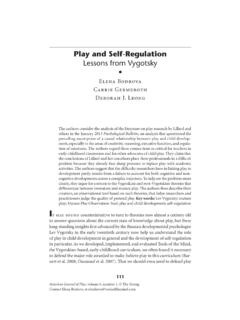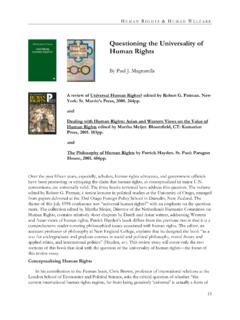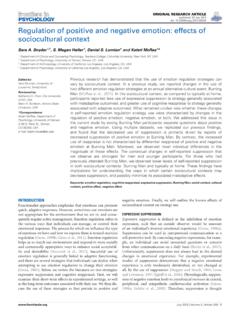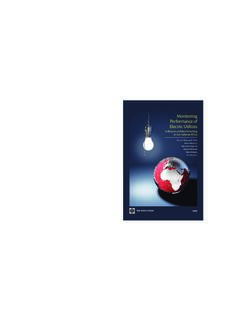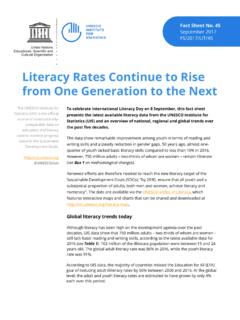Transcription of Violated: Women’s Human Rights in Sub-Saharan Africa By ...
1 TO P I C A L RE V I E W DI G E S T: HU M A N RI G H T S I N SU B- SA H A R A N AF R I C A 3 Violated: Women s Human Rights in Sub-Saharan Africa By Kathryn Birdwell Wester Introduction In contemporary Sub-Saharan Africa (SSA), women are facing Human Rights abuses unparalleled elsewhere in the world. Despite the region s diversity, its female inhabitants largely share experiences of sexual discrimination and abuse, intimate violence, political marginalization, and economic deprivation. Consider the following: A woman in South Africa has a greater chance of being raped than she does of learning how to read (BBC 2003); Seventy percent of women in Niger report being beaten or raped by their husband, father or brother (UNOCHA 2007); Maternal mortality rates in SSA are the highest in the world.
2 SSA is home to 20 percent of the world s births but contributes 40 percent of the world s maternal deaths (UNFPA 2008); In SSA, about half of the population lives below the poverty line; over 80 percent of the poor are women (UNFPA 2008). A major obstacle to checking these abuses is women s marginalization and under-representation within the nation-states responsible for implementing Human Rights standards: women in SSA represent only 6 percent of seats in national legislatures, 10 percent at the local level and a scant 2 percent in national cabinets (UNFPA 2008). Additionally, weak, male-dominated governments, a colonial legacy, and economic underdevelopment plague SSA nations and complicate efforts to redress violations of women s Human Rights .
3 Politics of Human Rights : Post-Colonialism and Plurality Post-colonialism on the African continent raises complex issues involving gender and nationalism. Regardless of the colonial experience and manner of its conclusion, all SSA states today have plural legal systems that incorporate native African customs with Western-style legal courts. Although designed to be culturally inclusive, these systems neglect gender as a category of analysis and often trap women s Human Rights between formal law and traditional culture. Such systems were formed primarily without women s input during the period of decolonization: local customs were either relayed through male tribal leaders or observed by male colonizers and women at times lost Rights previously accorded them by native African customs (Tamale 2008).
4 Men in SSA also lost Rights during the colonial era and still endure subordination by Western cultural and economic imperialism. As a result, SSA men have expressed frustration with this loss of power and control through violence and domination over local women (Reddock 2007). Similar to the experience of other developing regions, many attempts in SSA have been made to counterpoise women s Human HU M A N RI G H T S & HU M A N WE L F A R E 4rights with traditional African values. These claims, however, overwhelmingly solidify and perpetuate existing SSA structures of patriarchy. Much native resistance of Western Human Rights initiatives has therefore focused on transnational feminist efforts to name women s Rights as Human Rights (Cornwall and Molyneux 2006).
5 These protests are rooted in SSA s skepticism of importing Western solutions to local problems and some SSA women have questioned the efficacy of a focus on Rights as a way of advancing broader agendas of equality and social justice. Their argument, which centers on an observable reality and not a romanticized African past, is that a Rights -based strategy has had limited success in contemporary Sub-Saharan contexts; reforming the law means little to women who are informally prevented (through intimidation, impoverishment, illiteracy, etc.) from accessing legal systems. Are Rights , then, the best way to make a real difference in SSA women s lives? Feminists still say yes: more than simply encoding words on a document, gaining legal Rights fosters a sense of entitlement the right to have Rights which in itself constitutes an important dimension of Human Rights realization (Cornwall and Molyneux 2006).
6 If the existence of Rights is a necessary but insufficient condition for greater gender parity in SSA, then the ability to harness state protection is also crucial. Given the inherent overlap of Human Rights , their abuse necessitates a comprehensive response that must partly come from the state. Victims of domestic abuse, for example, experience not only a violation of their right to health but are generally intellectually, economically, and politically victimized as well. This interrelated nature of Human Rights is evident in the western African nation of Togo where almost 75 percent of women report having been beaten or raped by a family member. Togolese women have been financially and scholastically disadvantaged as well: women s literacy rates trail far behind that of men (45 percent to 72 percent) and women are legally obligated to relinquish their earnings to husbands or male relatives (Moore 2008).
7 Women throughout the SSA region who manage to escape abuse in the private sphere usually encounter an unresponsive criminal law system that is unwilling to intervene in private matters of the family. Attacks on Women s Bodies: Health and Human Rights Domestic Violence s Personal and Communal Costs If the intimate violence a woman experiences does not kill her, it prevents her full and constructive participation in societies across the SSA region. The fear and intimidation SSA women experience as a result of widespread partner violence has devastating effects for them and their communities. A recent study in Nigeria found that the threat of being beaten and the experience of marital rape largely determined if women used modern contraceptive methods (Oyedokun 2008).
8 For women in Nigeria and across SSA, this has devastating effects on their reproductive health and the general health of the continent. An estimated two-hundred thousand unsafe abortions take place each year in southern Africa (Ngwena 2004). Almost eighty thousand women worldwide die each year from these unsafe procedures and over thirty-four thousand of those deaths, approximately 40 percent, occur on the African continent (Ngwena 2004). Feminization of HIV/AIDS TO P I C A L RE V I E W DI G E S T: HU M A N RI G H T S I N SU B- SA H A R A N AF R I C A 5 At home and lacking money, property, and information about their Rights , many women are dependent on males who reinforce their control through violence, often sexual.
9 This has contributed to the feminization of HIV/AIDS in SSA. Unlike the disease s progression in the West, women in Africa are just as likely to be HIV positive as are men, and young women are significantly more likely to be HIV positive than young men (Stewart 2006). Safe sex initiatives that focus on limiting sex to marriage primarily lead by the United States are meaningless given that most women in SSA are infected by their husbands or long-term partners through unprotected sexual intercourse (Stewart 2006). Women s vulnerability to infection with HIV/AIDS is heightened by their inability to control when and with whom and under what conditions they have sex.
10 Furthermore, the burden of AIDS-related care is often disproportionately distributed between males and females, with women tending to be more responsible for the care of the sick and dying regardless of their own state of health. Early Marriage: A Brutal Custom Forty-two percent of African girls are married before the age of eighteen (Nour 2006). Child marriage is a Human Rights violation that prevents girls from obtaining an education, enjoying optimal health, maturing, and giving birth to healthy babies (Nour 2006). Socially, early marriage forces girls to drop out of school at a young age, permanently disadvantaging their educational careers and earning potential (Ouattara, Sen, and Thomson 1998).



